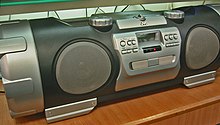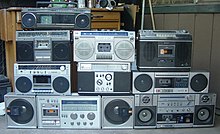Radio recorder

A radio recorder ( anglicized notation also radio recorder ) is a portable audio device with playback and recording functions for audio cassettes ( cassette recorder ) and a built-in radio for receiving radio broadcasts . The device is a further development of the previously used portable transistor or portable radio , with which nothing could be recorded. A characteristic of the original design is the large front in relation to the small overall depth. Its heyday was in the 1970s and early 1980s.
Many devices have a built-in microphone, often also a second cassette part or - since the mid-1980s - a CD drive for transferring to a second sound carrier. Today's devices have some slots (Engl. Slots ) for memory cards or USB ports for devices with MP3 files on.
history
The idea of combining a radio receiver with a magnetic tape recorder was realized even before the compact cassette was introduced . Tape recorders with built-in radio receivers were already on the market in the 1950s . However, the powerful electric motors required to move the large tape reels and the tube amplifiers customary at the time made the devices large and heavy (often 10 kg and more) and only allowed them to be operated from the mains. In the sixties, the introduction of transistor technology on the one hand and the development of thinner magnetic tapes and the resulting reduction in coil diameter on the other hand made the development of battery-operated, portable devices possible. However, such radio-tape combinations were not of particular importance in terms of either the variety of models or the sales figures. The concept was only successful with the use of compact cassettes, i.e. after another significant reduction in the reel diameter and simplification of handling.
Boom box


Large devices with powerful amplifiers and speakers are colloquially known as boombox or ghetto blaster . This is derived on the one hand from English to blast , here: "Make noise", on the other hand from the ghetto as the residential areas of mostly socially disadvantaged African-Americans and Hispanics in the USA. The ghetto blaster played an important role in the development of hip-hop and its often street-centered culture (cf. breakdancing , graffiti ). Outstanding devices were the JVC M-90 (which was shown on album covers by LL Cool J or the Beastie Boys ) or the Sharp GF-777; The devices, initially produced almost exclusively in Japan and soon copied in low-wage countries such as China , often had a pompous appearance with huge speakers with separate tweeters and many additional functions ( equalizers with numerous LEDs , numerous controls and controls, later also small televisions or karaoke functions ).
The old devices enjoy cult status among collectors, which is reflected in the sometimes high prices for well-preserved used devices.
present
In the mid-1980s, the "radio recorder wave" ebbed: the devices became smaller and the quality deteriorated. Today, the classic (and rather expensive) radio recorder has been replaced by smaller, cheaper products, which, however, do not match the “bolides” of the 1970s and 1980s in terms of quality.
Components
Common components of a radio recorder are:
- Radio receiver: AM (mostly medium wave only , more rarely short wave and / or long wave ), FM ( ultra short wave , mostly with stereo decoder ); Playback via loudspeaker, simultaneous recording on tape cassette possible.
- Cassette tape recorder (mostly stereo ): One or two drives (the second for dubbing)
- Optional: CD player
- Optional: microphone , playback via loudspeaker ( karaoke ) or recording on music cassette
- Stereo audio amplifier and mostly two loudspeakers , some with switchable base extension and bass boost, some with removable boxes
Radio recorders are often designed for operation with batteries (mobile use), but have a built-in power supply unit so that they can also be operated from the mains .
Game "Ghettoblaster"
In 1985 Virgin Interactive brought out the computer game Ghettoblaster , in which a Rastafarian and his radio recorder play the main role.
Web links
- Boombox museum page with information and more than 200 pictures
- Historical boombox - articles in one day
Individual evidence
- ↑ Page of the C64 game "Ghettoblaster" on the game pages of the C64 Wiki , accessed on April 10, 2016




